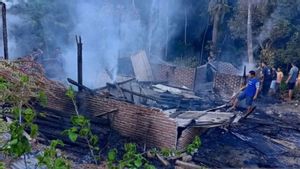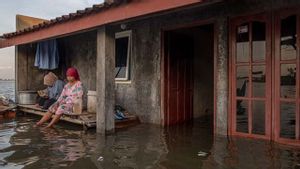JAKARTA - The Press Council has again increased the professionalism of journalists through training and facilitation of journalist competency tests. Activities will take place in 34 provinces. Previously, the Press Council together with 18 competency testing institutions from professional organizations and universities, from February to March 2021 conducted UKW in 18 provinces, with 896 results declared competent.
"The more competent journalists we get, the more optimistic the news and information conveyed to the public can be more accountable," said Jamalul Insan, Commission on Education, Training and Professional Development of the Press Council in a statement on Wednesday, April 21.
The duties and responsibilities of journalists who have been declared competent will get heavier. Professional journalists must uphold and implement the Journalistic Code of Ethics (KEJ) and the Press Law No. 40 of 1999, in carrying out his profession.
This year's UKW facilitation is a continuation of the 2020 program which cannot be implemented, due to the COVID-19 pandemic. Last year, the training and competency test for journalists were planned to take place in 20 provinces with a target of 480 participants, but only in one province, namely West Sumatra, with 24 participants.
"In 2021 this will be increased to 34 provinces with a target of 1,700 participants," said Henry Ch Bangun, Deputy Chairman of the Press Council.
This journalist certification activity has also been conveyed at the Hearing Meeting with Commission I of the DPR, early February 2021.
In the Press Council Regulation No. 1 of 2010, as updated by the Press Council Regulation No. 4 of 2017 concerning Journalist Competency Certification states that the objectives of journalist certification include improving the quality and professionalism of journalists, and it is part of the journalists' performance evaluation system by companies. Journalist certification is also part of the effort to uphold press freedom based on the public interest.
Apart from that, the journalist competency test also aims to maintain the dignity and dignity of being a professional producing intellectual works, avoiding abuse of the profession, and placing journalists in strategic positions in the press industry. "Journalistic products are intellectual works. The process of gathering information to broadcasting news must be based on facts and can be accounted for," said Hendry.
Like the goal of certification, journalists have a strategic position in the media industry, not just laborers, workers, who are just a complementary component. The newsroom must be filled with people who have competency according to their level. "The media plays a role in building and shaping public opinion - even using public frequencies in broadcast media - and must be managed by people who have competence," said Hendry.
Until now there are still many public reports regarding the abuse of the journalist profession. Not a few village heads, school principals, operational officials at the district / city level, were approached and intimidated, even extortion, by people claiming to be journalists. They always come up with reasons to confirm cases of misappropriation of funds, procurement plans or project work.
Journalists who have taken certification will have a competency card. The competency card is proof that those who hold the card at work have met the competency standards of journalists and uphold the journalistic code of ethics. The competency card also aims to protect the public, so that they can distinguish journalists who are good for reporting, so that they deserve to be received and given information, and journalists who only blackmail and intimidate them so they should be reported to the police.
BNSP DeniesIn another development, the Head of the National Certification Agency (BNSP) Kunjung Maseta denied the news in several cyber media that stated that BNSP would prohibit the Press Council from implementing SWCU.
"The BNSP commissioner did not make such a statement. We at BNSP, if there is a proposal for the establishment of an LSP [Professional Certification Institute] in the press sector, there must be a recommendation from the Press Council," said Kunjung, Monday, April 19.
Several cyber media previously broadcast news as if BNSP Commissioner Henny Widyaningsih delivered his direction to dozens of assessor training participants that BNSP is the only institution authorized by law to carry out competency certification.
Henny said that he did give an explanation about professional certification at the event of dozens of BNSP assessor training participants which took place in the LSP Multipurpose Room, 5th Floor of the Ketapang Indah Complex, Central Jakarta, April 14-18 2021. "But never said anything like what the media wrote."
18,000 Certificates and Journalist Competency CardsThe Press Council, which was legally established under the provisions of article 15 of the Press Law No. 40 of 1999, has since 2010 implemented a journalist certification program. After formulating the Journalist Competency Standards, the results of the agreement of all constituents of the Press Council, namely representatives of journalists' organizations, representatives of media companies, representatives of media companies organizations in various media platforms. The implementation of the certification is carried out through a journalist competency test process carried out by a journalist competency testing agency appointed by the Press Council.
Since being implemented for more than 10 years by 17 journalist competency testing agencies, the program has provided more than 18,000 certificates and competency cards to journalists.
The Press Council for the past 2 years has discussed with BNSP the journalist certification program. The two institutions agreed to collaborate functionally and professionally to improve the quality and professionalism of Indonesian journalists in a sustainable manner.
The English, Chinese, Japanese, Arabic, and French versions are automatically generated by the AI. So there may still be inaccuracies in translating, please always see Indonesian as our main language. (system supported by DigitalSiber.id)













